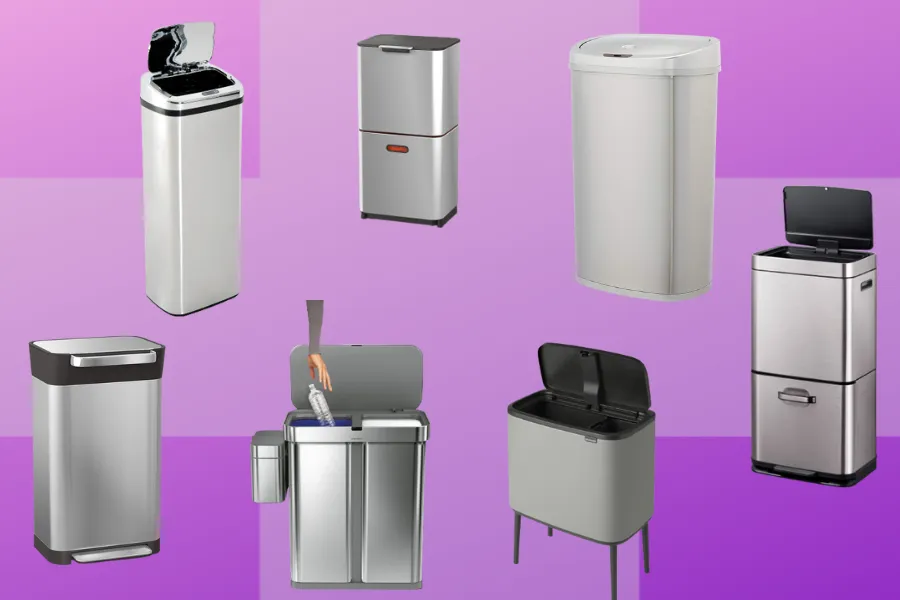The concept of sustainability is becoming increasingly important, and smart kitchens are stepping up to make recycling easier and more efficient. By incorporating innovative technologies and well-thought-out systems, a smart kitchen can help minimize waste, sort recyclables, and even reduce environmental impact. Whether you’re looking to optimize your recycling habits or integrate smart appliances, this guide will explore practical and tech-savvy recycling solutions for a modern kitchen.
The Importance of Recycling in the Kitchen
The kitchen is often the largest source of household waste. From food scraps to packaging materials, the potential for waste is significant. Proper recycling can:
- Reduce Landfill Waste: Recycling materials like paper, plastic, and glass prevents them from ending up in landfills.
- Conserve Resources: Recycled materials require less energy to process compared to raw materials.
- Save Money: Efficient recycling can lower waste disposal costs and reduce the need for trash bags and liners.
- Promote Sustainability: Recycling aligns with eco-friendly living and reduces your overall environmental footprint.
Smart kitchen recycling solutions not only make the process more convenient but also ensure compliance with proper recycling standards.
Key Components of Smart Recycling in the Kitchen

1. Smart Trash Cans with Recycling Features
Smart trash cans are revolutionizing waste management in the kitchen. These devices come with features like:
- Multiple Compartments: Separate bins for recyclables, compostables, and trash make sorting effortless.
- Automatic Lid Sensors: Touch-free operation reduces mess and enhances hygiene.
- Fill Level Indicators: Some bins notify you when they’re full, helping you manage waste more effectively.
- AI Sorting Assistance: Advanced smart bins can identify waste types and direct items to the correct compartment.
2. Composting Systems for Organic Waste
Food scraps make up a significant portion of kitchen waste. Composting is an excellent way to recycle organic materials into nutrient-rich soil.
- Indoor Composting Machines: Smart composters can process food scraps quickly and efficiently, turning them into compost within hours. These devices often come with odor-reducing technology and require minimal maintenance.
- Countertop Compost Bins: For a low-tech solution, consider bins designed for temporary storage of compostable materials before transferring them to an outdoor pile.
- Automated Compost Sensors: Smart composting systems can monitor moisture and temperature levels to optimize the decomposition process.
3. Recycling Sorting Stations
A well-organized recycling station simplifies the separation of waste.
- Modular Bins: Create a station with labeled bins for paper, plastics, glass, and metals.
- Smart Labeling: Use QR codes or app-linked labels that provide information about what can and cannot be recycled.
- Space-Saving Designs: Stackable bins or pull-out cabinet systems are ideal for small kitchens.
4. Smart Appliances with Waste Management Features
Some smart kitchen appliances include built-in features to support recycling and waste reduction.
- Smart Refrigerators: Advanced refrigerators can track food expiration dates, helping you reduce food waste by reminding you to use items before they spoil.
- Food Waste Disposers: Modern disposers grind food scraps into fine particles, making it easier to compost or dispose of them through wastewater systems.
- Integrated Recycling Units: Some appliances have dedicated compartments for recyclable materials, integrating waste management into your workflow.
5. Apps and Technology for Recycling Guidance
Technology can provide guidance on how to recycle correctly and efficiently.
- Recycling Apps: Apps like iRecycle and Recycle Coach offer localized recycling guidelines, helping you identify what materials can be recycled in your area.
- Barcode Scanning: Use apps to scan product barcodes and receive information about proper disposal methods.
- Smart Home Integration: Pair your recycling systems with voice assistants like Alexa or Google Assistant for reminders and instructions.
Practical Tips for Setting Up a Smart Recycling System
1. Assess Your Recycling Needs
Evaluate the types of waste your household generates most frequently. Focus on solutions that address your primary recycling categories, such as food waste, plastics, or glass.
2. Optimize Kitchen Layout
Place recycling stations in convenient locations, such as near the sink or cooking areas. Accessibility encourages consistent use.
3. Educate Household Members
Teach everyone in the household about recycling rules and how to use the smart systems effectively. Label bins clearly to reduce confusion.
4. Incorporate Automation
Automated systems, such as motion-activated lids or composting sensors, can make recycling feel effortless.
5. Regular Maintenance
Empty bins regularly, clean sorting stations, and ensure that smart devices are functioning properly.
Benefits of Smart Kitchen Recycling Solutions
- Convenience: Smart systems simplify the process of sorting and managing waste, saving you time and effort.
- Hygiene: Hands-free operation reduces the spread of germs and keeps your kitchen cleaner.
- Efficiency: Automated features like fill level indicators and AI sorting ensure waste is managed optimally.
- Environmental Impact: By recycling effectively, you contribute to reducing carbon emissions and conserving resources.
Challenges and Solutions
1. Initial Costs
Smart recycling solutions, such as automated bins or composters, can be expensive.
- Solution: Start small by using modular bins or low-cost apps to organize your recycling efforts. Gradually invest in advanced systems as your budget allows.
2. Limited Space
Small kitchens may lack space for multiple bins or composting systems.
- Solution: Opt for stackable or pull-out bins and compact composting units designed for tight spaces.
3. Recycling Confusion
Knowing what can and cannot be recycled can be challenging.
- Solution: Use technology like apps or smart labels to provide clear instructions and avoid contamination of recyclables.
Conclusion
Integrating smart recycling solutions into your kitchen not only simplifies waste management but also contributes to a more sustainable lifestyle. From smart trash cans and composting systems to recycling apps and appliances, there are plenty of options to suit different needs and budgets. By organizing your kitchen, utilizing technology, and fostering good habits, you can make recycling a seamless and effective part of your daily routine.
A smart recycling setup ensures your kitchen operates efficiently while helping the environment, making it a win-win for your household and the planet.

